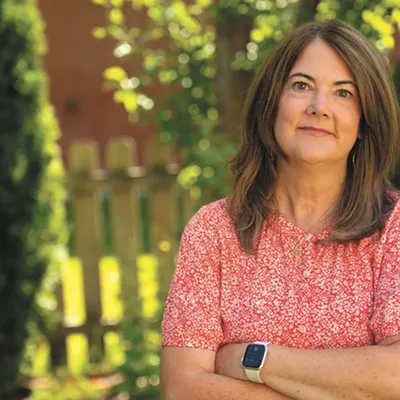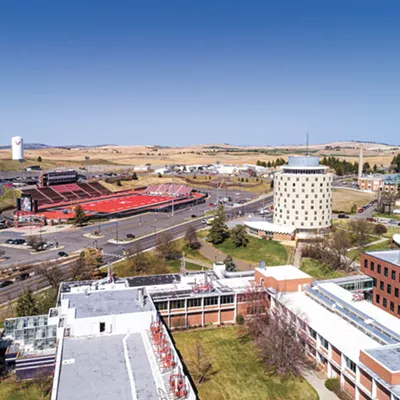Opening a brand new school can be nerve-wracking even in normal times, but by the time Lumen High School was ready to open in fall 2020, the downtown Spokane charter school for teen parents was facing the added challenges of a global pandemic.
Lumen's founder and Executive Director Shauna Edwards, 40, had worked for years to get everything in place to open the school to its first students.
In 2008, the former elementary school teacher and new mom was working on her master's in school counseling when she started the Spokane Young Lives program for teen parents. Pairing teens with mentors and offering life skills classes and regular dinners and supplies like diapers, the nonprofit work helped Edwards learn about the many struggles teen parents face.
In particular, she was discouraged over the years to see public school options for teen parents come and go in the Spokane area as the traditional school funding model failed to keep programs going for the relatively small population of students.
"In my head I kept just feeling like, ugh, I know all these students, they have these aspirations, they want to go to school, and right now there's not a lot of opportunities for them," Edwards says. "Being a parent is hard, and I felt like the teen parents I was working with were doing something even harder and didn't always have a ton of support. So I felt like I wanted to use whatever privilege I have, or access, to create pathways for them to have opportunities."
So, by 2018, after receiving some encouragement from community members and educators in the area, she left her job with the nonprofit to work on the application to establish a charter school specifically for teen parents.
Washington state's charter rules enable alternative schools to get public funding while offering education in a different format, often with smaller class sizes. After designing a school plan roughly 700 pages long with input from teen parents, mental health professionals and educators, the school was approved in June 2019.
Then they had a year to hire staff, find a location (above the Ridler Piano Bar downtown), and get all the gear in place to run a school — everything from furniture to books, lighting and more. The school also partnered with community members to start a not-for-profit early learning center right next door called G.L.O.W., or Go Light Our World, so the teens' kids could go to day care at the same time.
"That really is one of the pieces that helps our students come here," Edwards says. "They also serve community kids over there, but their whole thing is they will never turn a Lumen student away."
With the pandemic, the high school operated remotely for its first quarter, with students getting computers to work from home and staff members dropping off food and supplies to the teen parents as needed.
But it soon became clear that model wasn't working as well for many of the students, so the school was able to start bringing small groups onto campus on different days of the week. By the end of that year, the program was able to offer full-time in-person classes, and then the 2021 school year was able to start normally.
Now, the school serves about 60 teen parents, with about an 80 percent/20 percent split of teen moms and dads.
In addition to taking classes, the teens work in their kids' early learning classrooms regularly, and can access a slew of appointments right at Lumen, including therapy and different state programs. The students also get to enjoy electives that might take them out for everything from snowshoeing to walks through the park, while field trips connect real life experiences to what they're learning about.
"For example, they went to a golf course and went to the driving range and hit golf balls, and that was connected to physics and math," Edwards says.
Students are also able to participate in internships on Fridays, where they gain valuable real-life career experience, and the school tries to make sure those are paid opportunities, Edwards says.
The work is meaningful for Edwards, who grew up in Spokane after moving to the area as a kid because of her dad's Air Force career.
"I think a lot of it, in my head, comes with not doing something for someone but doing something with someone, to help them make the choices to go on their path," Edwards says. "We're all learning together. I approach a lot of things just like in my own life — I'm a really collaborative person."
Even when hosting a party, Edwards says she might organize a fondue night where everyone brings something to share.
In her free time, Edwards loves to run, hike and spend time outdoors and in her garden, and considers herself adventurous. The mother of three kids between 8 and 14 years old also spends a lot of time at sports activities and doing things like taking the family skiing or getting out on the lake.
"I love planning trips and going to places like Leavenworth or on a big road trip to California," Edwards says.
And, of course, she loves helping her students find the confidence to embark on their next steps as they raise kids of their own.
"I really believe everyone should have opportunities to do what they want and pursue their dreams," Edwards says. "So any way that I can be a piece of that and give people a voice in the process is what I strive to do."




















